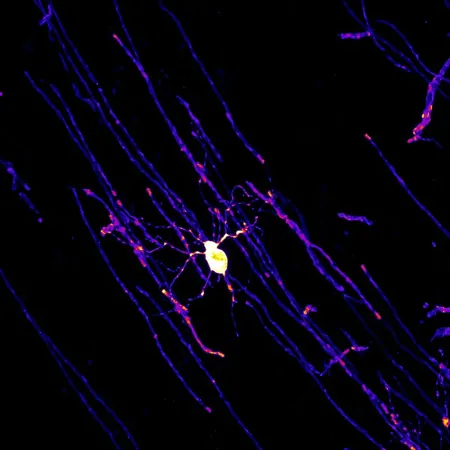
Unlocking the Brain: How Erythropoietin Could Revolutionize Myelin Repair and Cognitive Health
2025-09-16
Author: John Tan
In the intricate network of the brain, the speed and efficiency of nerve signal transmission are paramount. This crucial function relies on specialized cells, known as oligodendrocytes, which create a protective myelin layer around nerve cell axons, akin to insulation on electrical wires. This myelin sheath is essential for seamless communication in the brain; without it, cognitive functions such as thinking, feeling, and movement can falter.
Breakthrough Discovery by Researchers on Oligodendrocytes
Recent research led by a team at the Max Planck Institute for Multidisciplinary Sciences and the Central Institute of Mental Health has unveiled a game-changer in our understanding of these crucial cells. Researchers, spearheaded by Prof. Dr. Hannelore Ehrenreich and Prof. Dr. Klaus-Armin Nave, have identified erythropoietin (EPO), a growth factor primarily known for its role in blood formation, as a vital player in the maturation of oligodendrocytes.
Their experiments on mice revealed that EPO significantly accelerates the transformation of immature precursor cells into fully developed, myelin-producing oligodendrocytes. What's even more astonishing is that the body's natural EPO production—stimulated through mental or physical challenges—exhibits similar effects.
Implications for Brain Health and Functionality
"Our findings demonstrate that EPO not only acts as an external therapeutic agent but is also a naturally occurring substance that can enhance brain structure through activities that engage both mind and body," stated Prof. Ehrenreich. This breakthrough reinforces the notion that engaging in physical exercise and cognitive challenges benefits brain health through the EPO system.
Advanced analyses using single-nuclei RNA sequencing unveiled a plethora of genes activated or suppressed by EPO, many of which are critical for cell maturation and cognitive ability. Moreover, mice that lacked a certain EPO receptor showed signs of myelin structural disturbances in the hippocampus, a brain region vital for learning and memory. These mice also underperformed in memory assessments, emphasizing EPO's significant role in cognitive processes.
A New Era for Therapeutic Interventions
These findings suggest a paradigm shift in how we view EPO's role beyond just hematopoiesis; it may be pivotal in cognitive function and learning. With EPO already approved for medical use and capable of being naturally stimulated, we stand on the brink of exciting new treatment avenues.
Prof. Ehrenreich envisions a future where EPO could be harnessed not only for blood-related conditions but also as a potential therapy for cognitive disorders and neurodegenerative diseases like Alzheimer's. This could be achieved either through direct EPO administration or by promoting the body’s natural EPO production via targeted brain exercises.
As we uncover the layers of brain functionality, this research opens the door to innovative treatments that could transform how we approach cognitive health and recovery.





 Brasil (PT)
Brasil (PT)
 Canada (EN)
Canada (EN)
 Chile (ES)
Chile (ES)
 Česko (CS)
Česko (CS)
 대한민국 (KO)
대한민국 (KO)
 España (ES)
España (ES)
 France (FR)
France (FR)
 Hong Kong (EN)
Hong Kong (EN)
 Italia (IT)
Italia (IT)
 日本 (JA)
日本 (JA)
 Magyarország (HU)
Magyarország (HU)
 Norge (NO)
Norge (NO)
 Polska (PL)
Polska (PL)
 Schweiz (DE)
Schweiz (DE)
 Singapore (EN)
Singapore (EN)
 Sverige (SV)
Sverige (SV)
 Suomi (FI)
Suomi (FI)
 Türkiye (TR)
Türkiye (TR)
 الإمارات العربية المتحدة (AR)
الإمارات العربية المتحدة (AR)